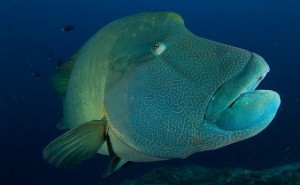Hong Kong…A leap forward on effective control of the international trade in Humphead Wrasse, the word’s largest coral reef fish, was taken last week when representatives from key countries involved in the trade met to discuss practical methods of making the trade both legal and sustainable.
“With proper implementation of CITES, trade of Humphead Wrasse can be managed for the long term,” said Dr Craig Kirkpatrick, Director of TRAFFIC in East Asia, “Through co-operation and action by a wide range of stakeholders in both export and import countries, together we can achieve a legal, international trade that will stop further decline of the species in the wild.”
The three-day workshop took place last week in Hong Kong and included participants from all the major consumer and source countries of Humphead Wrasse (Indonesia, the Philippines, Malaysia, China, Hong Kong SAR and Papua New Guinea), as well as representatives from FAO and Hong Kong’s seafood trade.
The workshop was co-organized by the Agriculture, Fisheries and Conservation Department (AFCD), the Management Authority of Hong Kong SAR, IUCN – the World Conservation Union, TRAFFIC and WWF.
Participants agreed upon recommended actions including developing regional co-operations, science-based guidelines for sustainable resource use, and promoting increased awareness among the fisheries industry and consumers.
Electric blue with large protruding lips when grown to an adult, the Humphead Wrasse is the world’s largest coral reef fish. Found on coral reefs across Southeast Asia, the Western Pacific and the Indian Ocean, this distinctive species can grow to over two meters long, weigh up to 190 kilos and live for more than 30 years.
Too often, however, their life is cut short by fishers, sometimes illegal, who sell the species to the luxury live fish trade in Hong Kong and China for up to USD130/kg. “As the major consumption markets, Hong Kong and China are taking the initiative to work closely with the source countries in the region to ensure the sustainable trade in Humphead Wrasse,” said Dr Andy Cornish of WWF Hong Kong.
In most areas studied by scientists where this species is exploited commercially, populations are in decline – sometimes by up to 90%.
Individuals are often caught as juveniles, before they’ve had a chance to reproduce.
Caught live, often with the use of cyanide, the trade threatens not only the survival of the species, but also its fragile coral reef habitat.
The Humphead Wrasse was listed as Endangered on the IUCN Red List in 2004, and in Appendix II of the Convention on International Trade in Endangered Species of Wild Fauna and Flora (CITES) at the 13th Meeting of the Conference of the Parties held in October 2004.
“Sustainable management plans and trade controls are still in development, and both exporting and importing countries are facing challenges in implementing the CITES listing,” added Yvonne Sadovy of IUCN. “We are hopeful that the results achieved at this meeting will pave the way for immediate action through joint efforts across different stakeholders, to ensure that all trade is carried out at sustainable levels and does not threaten the survival of the Humphead Wrasse.”

